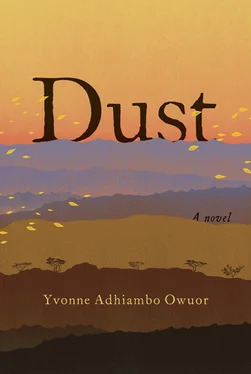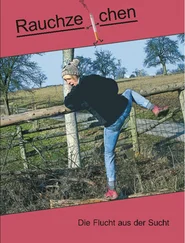Yvonne Adhiambo Owuor
Dust
First, this book is dedicated to you,
La Caridad.
Beautiful, beautiful, beloved Tom Diju Owuor
(Couldn’t you tarry,
Just a little bit, Daddy?)
1936–2012
My dazzling, adored, life-hope-beauty-breathing mama,
Mary Sero Owuor
For you my cherished siblings,
Vivian Awiti, Caroline Alango, Genevieve Audi,
Joanne Achieng, Alison Ojany, Chris Ganda, and Patrick Laja;
Joseph Alaro, François Delaroque, Rob de Vries,
and John Primrose. The next generation angels,
Karla, Angelina, Taya, Nyla.
For those gone ahead, for the ones still to come.
Thank you
“You will hear the voice of my memories
stronger than the voice of my death — that is, if death ever had a voice.”
— JUAN RULFO, Pedro Páramo
Follow my tracks in the sand that lead
Beyond thought and space.
— HAFEZ
Chon gi lala …
— LUO STORY BEGINNINGS
HE LEAPS OVER TWO FIRE-PAINTED BLOSSOMS RESTING ON THE stark cracked city pavement. Roused, these unfurl into late-Christmas-season orange-and-black butterflies that flutter into the violet shade of a smog-encrusted roadside jacaranda tree. A thrum becomes a hum becomes thumping footsteps, and soon he is entangled in a thicket of jeers and tossed gray, black, and brown stones as he flees toward a still-distant night. It is said that in combat some soldiers shoot over their enemies’ heads in order to avoid killing them. Some don’t even fire at all. Moses Ebewesit Odidi Oganda’s fingers tremble on the trigger of an old, shiny AK-47. He hurls the gun away with an “Urgh!” The weapon spills across the road — a low-pitched, guttural noise.
From behind Odidi, a wail, “Odi, man! Cover!”
Other chords of voices echo:
Hao! There they are.
Waue! Kill them.
Wezi! Thieves.
Odidi runs.
Three weeks ago the rifle was in the hands of a minor Somali warlord turned Eastleigh-based vendor of off-season Turkish designer women’s wear. The ex-warlord had given Odidi the weapon as compensation for camel water songs, which Odidi had sung inside the trader’s shop while he was picking up lacy feminine things for Justina, his girl. Odidi’s music caused wistful chirping sounds to come out of the refugee — lamentations for lost, happy pastoral yesterdays.
The taciturn man had approached Odidi. “You sing as if you know water,” he had said.
“I do,” Odidi answered.
“These were our old songs.… How did they find you?”
“A visiting man.”
“He has a name?”
Odidi paused. That name came with a torrent of buried history. A curt reply: “Ali Dida Hada.”
“Degodia,” concluded the warlord, naming a clan.
“No. No.” Odidi frowned at yellow, pink, black, and red panties and brassieres, his mind struggling. Then he said, “No! A stranger of too many lands.” And faces .
The trader leaned forward. “You know the song of Kormamaddo, the sky camel?”
Odidi had winked before whistling an overture. The man had pounced on nostalgia’s lyrics and belted them out. They had then ventured into and mangled other water songs.
“Desert ghost of yesteryear/Dredge the dunes/Draw sweet truth out.”
An hour later, as Odidi was paying half-price for Justina’s fripperies, the ex-warlord had muttered, “Wait.” He leaned down, hefted up a canvas-and-newspaper-wrapped, hard, four-part object and closed Odidi’s hand over it. “From my heart. Open it alone. God shield your songs and your wife.” He dabbed tears off his face, partly of relief because he had also offloaded a problem.
Now.
“Waue!” The pursuing Nairobi mob howls.
Odidi runs.
Not feeling the ground. Soaring.
Swish, zip, pop, rattle .
Bullets.
Grunt, thud . A man falls.
Ratatatata … Screams.
Odidi runs.
Tears flood. Terror-rage-love fuse.
The fallen ones are his men.
Guilt. Fury. Sorrow.
“Urgh!” The sound a captain makes when he falters and loses the team. Still, Odidi does not go for the pistol strapped to his chest. Odidi runs. Strength in his arms, his legs pistons, he sprints down Haile Selassie Avenue, jumps over prone, cowering citizens, pities them, the bullets aimed at him raining down upon them. He runs through the stench of decay, the perfume of earth hoping for rain, habits and dreams of Nairobi’s people: smoke, rot, trade, worry, residues of laughter, and overbrewed Ketepa tea. Odidi runs.
Incantation: Justina! Justina!
Shelter of faith.
The mob screams, “Hawa!”
Justina! Faith into sorrow into longing: I need to go home .
“Waue!” The answer.
Memory’s tricks. Odidi soars into the desiccated terrains of Wuoth Ogik, the home he had abandoned: his people reaching out for him, cowbells, bleating goats, sheep, and far mountains. He sees Kormamaddo, the grumpy family camel, dashing home from pasture. The sky of home, that endless dome. Flood tide in his blood. I want to go home . Odidi lifts his feet higher, trying to fly. Odidi runs.
Random humans in this slippery city of ephemeral doings crave his death. Ua! Something flutters and falls within Odidi like a startled, broken songbird. What have I ever done to them? He just wants to go home.
Justina!
Oasis.
He will cross spiderweb black roads to touch her.
Odidi runs.
He turns down Jogoo Road and glances upward, childhood habit born when Galgalu, the family herdsman, had told him that God was Akuj — Eternity Revealed as Sky. Up there now, orange dusk light’s bateleur eagles. Like marabou storks, they are prophet birds. Water in his eyes. Odidi blinks away Nairobi’s late-day drizzle. And the earth shivers behind him. A pitiful bellow, a goat protesting the injustice of a butcher’s knife. Death stinks of cold emptiness. Omosh: the last of his men. Odidi gulps down vomit. Tastes salt. Tears in his mouth, sticky, wet of hands, as if he has dipped them into blood. Was this the destination of all their wars?
Shadow and regret.
Stumbling.
He must move.
But the city, his city, has all of a sudden changed its shape and turned against him. Roads slither into hard walls; blocks of shadow scurry away to expose his next step to ravenous, carnivorous urban trolls. Faster, Odidi runs.
A whisper from his remote past like a brushstroke on his bare back: You can’t live in the songs of people who don’t know your name .… Odidi grabs at his throat, suffocating in a burst-of-fire clarity. What have I done? Odidi runs.
Glimpse of his fleeting shadow’s reflection on darkened glass panes. What had he done? Odidi runs. Louder: You can’t live in the songs of people who don’t know your name . He understands now that he must protect his family. Odidi runs. He must reach a stranger; stop him from boarding a flight from Heathrow to Nairobi. First, he must find the labyrinthine alleyways, his escape routes. Pounding steps behind him, sundown’s cool breeze on his arm and face. A moan within his throat— let me go home . Odidi runs. Damp-fisted hands propel him forward, and the city’s twilight rain saturates his skin at the same time that he hears a phone melody from within his coat pocket. Cesária Évora’s “Um Pincelada.” His sister’s calling tune.
Grim grin. Only Arabel Ajany Oganda would phone at a time like this. If he were to answer, he predicts her first words would be “Odi … what’s wrong?” He would have to say, “Nothing, I’m taking care of it,” as she expected him to, and he always did. And he was. Odidi runs. “Um Pincelada” plays. If he could, he would say, Hello, silly . After more than ten years of nothing, today he could tell her: I’m going home . She would laugh, and he with her. The music stops. Hello, silly .
Читать дальше











